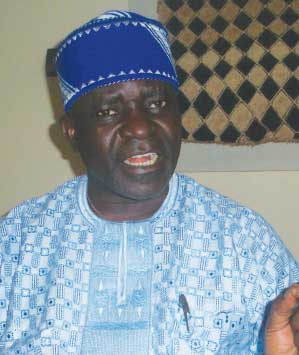Ifedayo Adedipe, a Senior Advocate of Nigeria (SAN), is a prominent legal practitioner based in Port Harcourt, Rivers State. In this interview with Senior Correspondent, ONYEWUCHI OJINNAKA, he speaks on election petitions and the crisis rocking Rivers judiciary, among others.
In a matter of weeks from now, the 2015 elections will be held. Do you see the readiness of the judiciary to promptly adjudicate on election disputes that may arise?
I think the judiciary has always been ready. The problem with our society is that we are looking for angels among men. If you look at the fact that we have 36 states and the Federal Capital Territory (FCT), I do not know the number of judges we have, maybe we have about 500 jurists. It is bad to have a corrupt judge in the system, but we must adjudge the judiciary by the conduct of the majority of the justices, male and female who have discharged their duties very well. That majority always ready, so I believe the judiciary is ready to adjudicate on election petition matters.
When you look at the role the judiciary played in restoring sanity in those tensed days, you will know that our judiciary has performed very well. In the last presidential election, the Supreme Court was divided in one case; it was ratio four to three. This was because of the use of ballot boxes that had no serial numbers and in violation of the Electoral Act. Three justices said they are nullifying the election while four said they would sustain it. That tells you that our courts are already alive to the responsibility.
Do you agree that serving judges should be excluded from adjudicating on election petition matters?
I am indifferent, quite honestly, because when you go for retired judges, they have nothing more to lose. Serving judges could be dismissed if they are compromised, but when a judge is already retired, he has nothing to lose. So we should use serving judges. If the electoral process is transparent, chances are that it will not be challenged. What we need do is to reform the electoral process, and there should be continuous voters’ registration exercise. If we keep updating our voters’ register and the process is transparent, free and fair, fewer people will go to court. It is even dangerous to use retired judges. I would suggest that we use those that are still sitting and who are well-monitored.
What constitutional requirements should be met by a presidential candidate before he or she could be declared a winner?
First, he must have a majority of lawful valid votes. Second, he must have a spread in the 36 states and must have minimum of 25 per cent in at least 24 states. If these conditions are met, then he is validly elected.
Some of your learned friends argue that the 180 days timeframe to hear and determine election petition is inadequate. Do you agree with their position?
I think 180 days should be sufficient to conclude a particular petition, if there is a robust determination to so do. In other words, you do not give room for stay of proceedings. Whatever objection you have, you condense them into the record. If, for instance, someone is raising either locus standi or jurisdiction issue or any objection at all, it is my view that they should all be taken together in the entire proceedings. The idea that the tribunal will wrongly rule that it has no jurisdiction and the appellate court says it has jurisdiction, such cases pose some challenges. If a court wrongly but genuinely believes it has no jurisdiction, and if on a proper interpretation of the law, the appellate court is of the view that the court has jurisdiction, the period the court will not be sitting should not be counted as part of the 180 days, so as not to short-change the petitioner.
I think that is where the interpretation has to be dynamic and creative. It should be 180 days of non-stop adjudicatory work. Where the lower tribunal wrongly rules that it has no jurisdiction or it grants stay of proceedings for whatever reason, maybe for two or three weeks, I think these weeks should be restored.
How then can you reconcile the interpretation of the Supreme Court on the issue?
Well, the Supreme Court is the final court, but it is not infallible. Because the Supreme Court is not infallible, there is provision in the Supreme Court Act that permits a review of the proceedings of the court, and the court can set aside its earlier decisions that it considers erroneous. I believe a constitutional court could be set up; that is, a full court of seven justices. The court can invite views from intellectual lawyers and lawyers in practice to reconsider that interpretation. What I have noticed is that, it does appear that some lawyers and some judges, with profound respect to them, think the constitution is like any other statute, which you have to interpret strictly.
The Supreme Court is the organic law that sets the parameter for governance. So, its interpretation should be flexible enough to meet the demands of the time in which we find ourselves. I think this kind of dynamic approach is what informs why the American Constitution, which is only eight pages long, with 27 amendments, has served them for more than 250 years.
Some months ago, some judges in Ekiti State were attacked by hoodlums within the court; but till date, no suspect has been charged to court.
I have always held the view that the reason we are not making progress is because of our utter disdain for the rule of law. We as a people believe that there are no penalties for wrongdoing. It is regrettable; it is condemnable that individuals for whatever reason would desecrate the temple of justice. From 1960 to date, have you heard of a single person arrested for political thuggery and tried? There is not a single one in the law report, so that attitude is what you see playing out in Ekiti State. But I think we should call a halt to it; the police should dust their files and whoever is responsible should face the wrath of the law. People should learn to behave in civilised fashion. If people went to court to say a particular person should not contest election, they have a right. The judge, who is to adjudicate the matter, is constitutionally empowered to so do. The police should live up to their constitutional responsibilities. It is regrettable that nothing has been done so far, but it is not too late, because there is no statute of limitation in criminal law. That is why 40 years down the route, you can still be held accountable. A whole lot is wrong with us as a country, but law and order is the first step towards a civilised society. So when people assault judicial officers as it happened in Ekiti, everything must be done to bring them to book.
What is the current situation in Rivers State judiciary?
Since June 2014, the courts in Rivers have been under lock and key, and the gates permanently welded and the country appears unconcerned. I want you to imagine the cost to the people. Judges would be paid for doing nothing and judiciary workers would be paid for doing nothing. Litigants cannot go to court and businesses that require judicial intervention cannot be taken to court. Documents that needed judicial endorsements cannot have them and junior lawyers in particular are finding it difficult to make a living. Imagine a man and his wife who are lawyers, who are under five years at the Bar and have nothing doing because of ego issues. I believe that is a tragedy of unmitigated proportion and that it can happen in the 21st century Nigeria and the country pretends nothing is happening, this is a real tragedy.
We need to take a second look at our constitution. Nobody should be allowed to do that kind of thing that is happening in Rivers. It is dangerous, unfair and anti-people. There is no way to justify it that from June 6, 2014 and maybe until the governor leaves office, the court will remain under lock and key. Unfortunately that is where we are.
What is your position on standard of legal education in the country?
The way to answer that question is to look at what was obtainable in my days and what they have now. I attended the then University of Ife and we had professors of law and quality lecturers. They were not the type who will ask students to look for hand-outs. We had law library where you will see all sorts of law reports and other quality law books. We are in the digital age, and you have digital professors and lecturers too. I have had occasions to take in some lawyers from our universities and students from the Law School to practise with me. Basically, in terms of the broad-spectrum of knowledge, they are not doing badly. But the materials may no longer be there, which is the nature of our nation. Some legal practitioners have better libraries than some universities.













